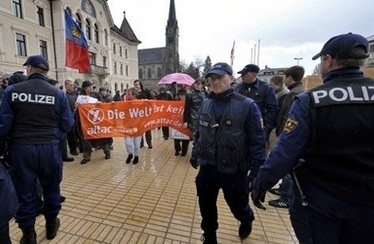In Europe, widening probe targets tax haven
(Agencies)
Updated: 2008-03-26 10:12
Updated: 2008-03-26 10:12
London and Berlin -- Nearly two decades after taking the helm of Deutsche Post, Klaus Zumwinkel had transformed Germany's national postal service into a global mail and logistics giant with annual revenues of €66 billion ($102 billion) – more than double those of FedEx. A director on the boards of Morgan Stanley, Deutsche Telekom, and Lufthansa, he was one of Germany's most prominent executives.
Then, on Feb. 14, he surrendered to police amid suspicion that he evaded €1 million in taxes. The next day, he resigned, becoming the first to fall in a massive probe that has broadened to nine other countries.
|
|
But even as Germany conducts its biggest tax-evasion probe ever, experts warn that technological advances and opaque banking practices are making it easier for individuals to stash trillions of dollars a year in havens such as Liechtenstein, Monaco, and Luxembourg.
"In this new, more globalized, integrated world, where you can go on to the Internet and open a secret offshore bank account in eight minutes, it's getting easier for a wider spectrum of the population to hide assets offshore and more difficult for tax authorities to follow the financial trail," says Grace Perez-Navarro, deputy director at the tax unit of the Organization for Economic Cooperation and Development (OECD) in Paris.
The OECD and the European Union (EU) have led the way in tackling tax evasion, and countries such as Ireland, Italy, and the Netherlands have all reported minor successes or launched new initiatives in recent months. The German probe, based on a list of 1,400 alleged tax cheats provided on CD by a paid informant, has yielded more than 300 suspects and $47 million in recovered taxes.
German tax inspectors are expected to launch a new round of raids shortly, and Spain, Britain, Australia, and the US are conducting their own investigations – some based on the same informant.
Liechtenstein, which has identified the informant as Heinrich Kieber, a former employee for a subsidiary of the royal family's bank, LGT, has contested the legality of the information. Germany's domestic intelligence services paid a reported $7.5 million to obtain and verify the lists, $6.2 million of which was pocketed by the informant.
The scope of the problem The Tax Justice Network (TJN), a coalition of campaigners opposed to tax havens, put the amount of personal wealth held offshore at $11.5 trillion – more than four times the total US national budget for 2007. The OECD posits a more conservative figure: $5 trillion to $7 trillion.
In total, TJN estimates that the world's exchequers are deprived of at least $250 billion a year. Britain reckons its annual income-tax shortfall is $40 billion, Germany $30 billion, and the US as much as $100 billion a year.
"Tax havens have declared war on honest taxpayers," says US Sen. Carl Levin (D) of Michigan, who along with Sen. Barack Obama (D) of Illinois is co-sponsoring the "Stop the Tax Haven Act," introduced last year. "What this [German scandal] demonstrates again is that tax-haven abuses are a worldwide problem."
It may also have unsettled some tax dodgers. Mr. Zumwinkel was the most high-profile of more than 160 suspects to be netted, and more than 150 have voluntarily come forward. Since then, dozens of Dutch nationals have also volunteered information about their savings. And there could be more: Last week, German newspaper Die Welt reported that a former employee of a Swiss bank offered to sell German officials files listing more than 30,000 account holders.
|
|
|
||
|
||
|
|
|
|


